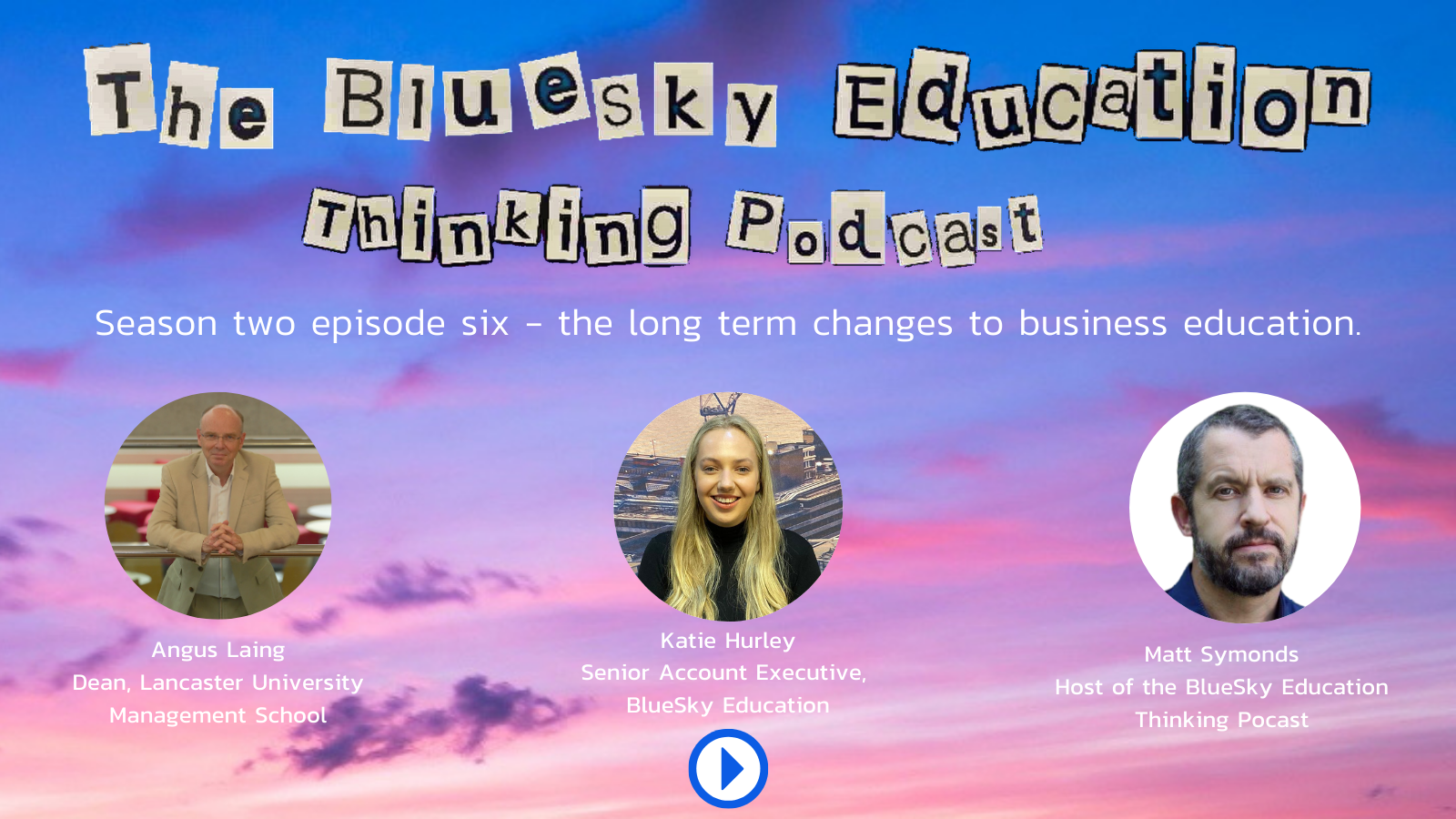The BlueSky Education Thinking Podcast – Season 2 Episode 5

Author:
Katie Hurley
Continuing with the theme of long term changes to business education in episode five of season two, but from the perspective of adapting and embracing opportunities for change, the BlueSky Education Thinking Podcast sees International BizEd Guru Matt Symonds – as well as BlueSky Education’s Stephanie Mullins and Kerry Ruffle – talk to Dana Brown, Dean of the Sprott School of Business at Carleton University and Angus Laing, Dean of Lancaster University Management School.
Here’s what they had to say
Steph: It's really interesting see how business schools have responded in the short term and the changes they've made that have really made a difference, and they've done it so well. But now we're beginning to see the changes that they're going to make long term. So that's online learning, digital infrastructure, what changes are actually going to have an impact well into the future, and really benefit future students. It's a topic that many schools are starting to look at and starting to implement and we've spoken to more deans about this future impact.
Matt: There was perhaps a scenario that we could have imagined as recently as five, 10, 15 years ago where, in terms of the MBA and Master's programmes, as you had some of the global brands that were taking a step in that direction, they had the potential to bring in classrooms from all over the globe, and really undermine many of the local business schools. It has been very interesting to see not only until COVID, has that tipping point of online delivery, we're only really now starting to see that if you look at online MBA programmes, there are perhaps only six or seven really top-quality programmes that offer an online MBA, I think that that will change dramatically in the next five years.
But even with that global reach, I think the ability of business schools to have such local influence, you know, they are major employers as sources of talent in their local regions. And I think that you will see many business schools continuing to play that important role now, perhaps, how they do it, and the timeframes with which individuals now interact with business schools, we still have this model that sees individuals going towards one-year, specialised masters programmes, in fact, there's incredible demand at the moment during the downturn for that, and then the MBA at that later stage. But a lot talk about how it will become far more modular. And we will pick and choose the skill sets that we're then looking to deliver through our professional careers.
One of the areas of great interest to me is the changing relationship that business schools will see with technology partners, right now, I see it as a partnership with the likes of Coursera, Google and many others. But Google themselves are saying, well, we will offer courses that will be sort of employer qualifying. And you can do them in just a handful of months, I think for the time being Google and other tech partners will need the business schools to work side by side. And it'll really start to play out perhaps five, 10 years from now as the tech field have the capacity to generate their own content. So, it's going to be a tough battle. But, you know, ESCP is the world's oldest business school, they are 201 years old. So, they have shown the ability to adapt to those circumstances and the theme of this particular session is about being able to adapt and embrace those opportunities for change.
Kerry: One thing we can all agree on, and particularly in light of coronavirus, is that this isn't something that's going to go away particularly quickly. So, business schools have done the firefighting now, they've put in place programmes and support systems and ways in which they can deliver their programmes and their learning in the short term. The business schools now need to be looking to the future, they need to appreciate that it might be for quite a while where we're all based at home, we're not travelling and we're not engaging in the same ways we used to. So how is that going to impact what they continue to offer to students and to corporates and to businesses that they work with? And what it is they will need in terms of the professionals they're bringing in? On the teaching and the development side? What are they going to need from new faculty? What are they going to need from new corporate partners? And how can they best position themselves to step out into this new world? And it's this topic in particular that our interviewees want to discuss today. Isn't it Steph, who will we be hearing from in this episode?
Steph: That's right. We're really looking at opportunities. And we are kicking off with Dana Brown. She's the Dean of the Sprott School of Business at Carleton University. And we'll be following up with Angus Laing and he is the Dean of Lancaster University Management School. So we kick off with Dana, here we go.
What changes have you seen during this period? Because you've been in your role about a year now, is that right?
Dana: That's correct. Yes. I've been at Carleton for one year, this summer. Yeah, a dramatic amount of change really, from March of this year. Obviously, the most significant change was the need to shift all of our learning to a remote format. And this happened virtually overnight. I fortunately work with faculty members who are extremely flexible and supportive and really all pulled together to make that happen. But in business education, a lot of what we do is experiential. There's quite a lot of hands-on learning working in companies, we always place a high value on teamwork, on networking, on interactions. So, we had to really think how are we going to replicate that experience for our students in a remote format. So that's been the biggest transition for us.
I think the other transition has really been our global presence. I mean, for all of us, in business schools, we are accustomed to travel, to making those connections at conferences, presenting our papers, and networking with people. And that, again, all had to transition to a new format. So, we've learned new ways of connecting with one another in our community, connecting with our students, and then connecting globally, keeping that reach. The other major change that I've noticed is that the conditions around the pandemic have almost immediately pulled us closer to our local business community. And it became clear within weeks of us locking down that we would need to be closer partners with the business community and with other community organisations, in the process of recovery, rethinking, restrategizing for the future. And while this was a part of our mission in the past, it's now a core part of our mission. And I see that, for the next decade, our business school is going to play an important role, collaborating with the local businesses to aid in recovery. I say the word recovery, but I always like to say we don't want to go back to the way things are, we want it to be better. So, we’re working with the business community to ensure that that happens.
Steph: Fabulous, and what a positive outcome from something that has caused so much unprecedented change.
Dana: Yes, and that's not to anyway undermine the suffering that people have experienced during this time. And businesses, I mean, to have a kind of positive outlook in the future doesn't mean that we don't recognise how hard this has been for small business owners. I think we are merely looking at how can we how can we help add value to the future, there'll be a rough road, and I think as many minds that are on the challenges that we face, the better. I hope that I can help to facilitate some of the connections between the great minds at my university and the needs in our community.
Steph: Absolutely. I mean, business schools are full of such fantastic brains that can really help provide actual useful advice and guidance for people who are trying to navigate a whole new world and, me in my position, I see editors looking for these comments to help tell people how they can make the world better and improve their businesses and be resilient to change, and it's wonderful that business schools are more and more doing that with their local communities directly.
Dana: Yes. The thing is that business, it's a discipline on to itself, but it's also an approach, a set of behaviours and skills that can help in a number of different situations. So we don't only work with businesses, we also try to reach out to community organisations, government organisations, we're here in the nation's capital, Ottawa, and apply the same kind of entrepreneurial mindset, the skills that we use to leverage resources, see the big picture, strategize in business to think through some of the challenges that we're facing in the world today.
Steph: That's fantastic. And it's interesting that it's not only the academics and the faculty that are offering help and the business school staff, but it's also a lot of students and their projects, they're trying to make a difference and help as well.
Dana: Yes, well, our students have been absolutely fantastic in this. One of the initiatives that we put in place right away in the summer was we offered our students a certificate in crisis management and recovery. A couple of our professors pulled together, they were experts in crisis, and pulled together a certificate programme and then we matched the students with local businesses and teams to help work with those businesses on strategizing for the future. And that's been run through our Sprott student consultancy organisation, which has also strengthened during this period. It was a pilot programme that is now a large programme, because it is a vehicle to working with and supporting local organisations.
Steph: Awesome, another positive impact and hopefully something that will continue long term, and something that we'll see for years to come. Because we're definitely seeing a lot of changes that are probably going to be for a while and will change the way business, and business education in particular, is taught and is delivered. Do you see other long-term changes to the industry in that respect?
Dana: I do. Another change that came up when you just asked that question, in my mind is, consumer habits are changing. I think, overall society is reflecting a lot more on our ways of living, our values, what we consume, how we consume, where things are coming from. I think this will have a major impact on business practice. I've long been an advocate for sustainability in business practices and responsible management and now I think this becomes a core element of the way that businesses operate in the future. So, our intention in our business school is to ensure that our students are always thinking about well, what is the purpose and potential of business to make a difference in the world and always thinking about what the implications are of certain behaviours and practices in business, I think that will become a long-term part of business education. And I speak not only from my own school, but also from being a part of the industry and connected to other business schools, and Deans, that there's a lot of a movement in that direction away from teaching the simple shareholder value model of business, to thinking more broadly about businesses in society.
Steph: That's fantastic. And hearing about the positive impacts that business schools are having is even better, because it is real world impacts, it is not an idea anymore, it's definitely an actual impact they're having on real businesses and real people.
Dana: Yeah, I think so. And I think that may be another way to frame the shift that's happening, right? We have to be there and show our relevance and I think that's the case, in higher education, overall, in general.
Steph: I agree, I think Higher Education and Business Education is very good at staying relevant, and understanding trends, and making sure that they are teaching their students and researching these aspects that are becoming so important in the world.
Dana: That's right. Absolutely.
Steph: Fantastic. So, it's really interesting to hear your thoughts on all of this. I was wondering, is there anything that you would like to speak about we haven't touched upon yet in this podcast?
Dana: No, I just would say that I think the future of business education is exciting. I think it's going to be different. I think one thing to expect is that there will be, as a result of the closer partnerships that I was talking about earlier, they represent not only an opportunity for impact, but they also represent an opportunity for students to learn in a different way. I think there will be a lot more hands-on learning for students, opportunities to work in companies to kind of go with the flow. There's no textbook that's going to tell us what the future looks like, right? So, we need to be in there, engage, coming out, reflecting, using our knowledge to influence the direction that businesses are going, and I think students will be a part of that. To me, that's an exciting educational journey for students to go on.
Steph: Yeah, definitely and having that aspect of student experience is really cool because a lot of the time we talk about changes being in delivery online, so it's more prep, it’s more blended learning, it’s more virtual as well as face to face, then those experiences as well. That's another aspect of how education and delivery will change most likely in the years to come.
Dana: Absolutely. So no longer the classroom becomes the locus of education. I think the world, the community, the businesses, they become the places where education is occurring. I do think that the remote aspects and the online learning will become a part of our future, a permanent part of our future for sure. I won't completely replace face to face, I hope we get back to that. But I think that what we are learning in the process of moving to remote learning is, you know, where is that most beneficial for our students? Where can we increase our reach, increase our own productivity? And best work with our students?
Steph: Absolutely. So ultimately, those are going to be the leaders of the future, and they're going to manage these businesses and make an impact on society in that respect.
Dana: Yes, absolutely.
Stephanie: Awesome. Well, thank you so much for joining us.
Kerry: So, will Business Education of the future be embedded in businesses and move away from the classroom? Well, that remains to be seen. But what we do know is that business schools will need to continue to evolve their offering. Angus Laing is Dean of Lancaster University Management School, and the former chair of the Chartered Association of Business Schools (CABS). He believes that whilst coronavirus may have forced business schools to change their practices quicker than they may have planned, this evolution has always been on the cards and is a vital step forward in business education.
Steph: Angus, could you begin by telling us about the changes you've seen at your own institution?
Angus: I suspect what we've seen absolutely mirrors what we've seen in most other institutions, not just in the UK, in Europe, but globally. That great pivot from face to face to online. I suppose the abiding sense I get is that many colleagues (we know how conservative academic colleagues can be, we couldn't possibly do this and this is going to take years to change) that pivot occurred in the matter of months, if not weeks, given the timing that it hit us. So, it's demonstrated to me an ability for schools, for academics, and I think when you look across the sector, to adapt very quickly. Now, obviously, within this has been a huge set of trade-offs, you would not if you were doing this, under other circumstances, this type of move, started flipping the classroom mentality would take a lot of a lot of investment and consideration. We've not been able to do that. So, I'm not suggesting that what we've done any more than what other institutions have done is perfect, but it has provided us I think, with a platform for a different way of looking at our future for really thinking long and hard about not so much about what we deliver but how we deliver. So, I think it's the beginning of a long journey. There's a lot we’ll recognise in the broader media. But the pandemic being described as a great accelerator. There is no question that for the Business School world for Lancaster, it has been a great accelerator during that change, in that pivot to digital.
The only other thing I draw attention to is I think it's raised some questions about our income streams, in particular dependence on international student flows. Particularly in many schools’ dependence on a relatively small number of markets, China, India, most obviously, and the financial consequences not just on the business school, but on the wider university, given the role we play as business schools within a university on the sustainability of that model. And that question in my mind is whether the pattern of international student mobility we've grown accustomed to, many ways to actually grow to love, will continue and if not, what will we be replacing it by both in terms of the delivery of education and in terms of income streams?
Steph: I think you've raised two very interesting points there, firstly about delivery and how teaching will actually be carried out. And secondly, about student and international travel and their recruitment. And I wonder if, with your connections in the industry, you're hearing about what people's feelings are towards teaching online and towards student recruitment. And so, if we begin with delivery, do you think that this is going to have a long-term impact in how it's taught?
Angus: Yeah, I think it almost unequivocally will and I think it will work in a good way. So, we've all talked for long enough about flipping the classroom. And again, it's back to the point I was making earlier. There's been every reason as to why we won't do, why we will do, that was too difficult, was too costly, etc. We've effectively gone into that certainly, mostly institutions I know of, I talk to, looking at the lectures are online, if we're doing face to face teaching, it is going to be seminars, workshops, and isn't that very much what the whole idea behind the flipped classroom was and I think I find it very hard to believe we're going to go back to that, I certainly get a sense from talking to students. We have had the advantage and many of us as Business Schools will have had this, because we tend to teach later into the year than many, many other disciplines, particularly master’s level. And all of the students, when it's synchronous, online delivery, they will do through Teams, through Zoom, whatever mechanism, there is actually a real like for that. We all know many students, aren’t going to go and put their hand up in a large in a large lecture theatre, they are much happier doing it when it's down in the chat bar on the side. And that I think is something that is valuable in terms of the learning experience. I think if we start to look at some of the asynchronous activity, we can really start to look at how we construct our programmes. And do more, if you like, preparatory work before students arrive physically for a programme, assuming we will continue, as I think we will, with programmes that do have a strong face to face dimension.
So, I'm looking at some of the work that that we're doing. We're providing students with more preparatory work material that used to be in the course they received in lectures when they're here. And what we are then substituting that with is more experiential learning opportunities when they're here. So that does need them to be to be physically present, can we get them out into companies? Can we get them working projects, that type of work, but moving some of the preparatory work, to before that before the programme starts, once they've registered? Once they've paid their deposit? It's, I think, opening up some really, really interesting opportunities.
I think the level of pervasiveness of the technology means that most of our students are very, very comfortable with it. If you've gone back five years, they probably wouldn't have been as comfortable as they are now. And everybody's comfortable, even the middle-aged academics and helpers are quite comfortable with it as well. So, that I think is what's really going to drive it forward. So, I think it's not going to go back, this is not going to be a wave that suddenly washes through and we're back to the way it was before, it is going to change, it is going to change it permanently.
I think the interesting issue is, if it changes it permanently, what does that mean, in terms of our infrastructure? We've all gone out. Lancaster is a quintessential example going and spending tens of millions of pounds in a new building and lots of offices. What are we going to be doing with that? What do we need in terms of lecture theatres versus more seminar rooms, a whole variety of issues around the physical infrastructure. I sit on a committee when we think about capital investment, we don't think enough about the digital infrastructure as part of that and if we do, it's relatively small in terms of the scale of investment. We've also got to start thinking about the staff we need, have we got the right staff do this? There's definitely a different approach. What do we need? Is it disciplinary oriented research academics? Or is it more around people who are capable of learning facilitation, supporting the learning experience? So, I think it raises a lot of questions for us all.
Steph: Absolutely. It sounds like there are a lot of questions around investment, and where are you going to invest that time and that money? Is it on people who are going to really boost the progress that we've seen during this pandemic for online teaching, or for working from home, rather than for lecture theatres? Because when we think of teaching now, do we think of standing at the front of a lecture theatre with students’ side by side, arm to arm in a class,? I don't think we do anymore. And do you think this thought process is really going to have an impact now?
Angus: Yeah, I think it is. I've been genuinely impressed with the way in which our academic colleagues have embraced this move. Obviously, there's been people more enthusiastic and others obviously less enthusiastic. But I've been overall impressed. We were talking about this earlier, this expression ‘the new normal’. I think there's a little bit that people are not necessarily convinced that the world is changed completely. For what it's worth, I think it has, I think it is this catalyst, that great accelerator that has crystallised a lot of things that we were acting in the background. It's just now the dam has burst, it’s open. I don't think we're going to go back.
Steph: I think you're right as well. And it's interesting that at the beginning, you talked about how this is going to affect international student recruitment and actually how universities are funded. It's interesting that you talk about these changes, because I think a lot of the changes are what students have been asking for, in terms of flexibility, in terms of online learning, in terms of having those resources and those materials online, I think, has been asked a lot by a lot of students, and I wonder if that's going to have an impact in attracting them? In terms of student recruitment, what are your thoughts? How do you think that's looking now?
Angus: Right, so there's certainly several strands that I'd come back and describe, I was smiling when you were talking about students having asked for this. We know, for example, across the University of Lancaster, the Student Union has been pushing very, very hard for digital and digital content to be made available. And it's met with a sort of fairly cautious response. We've been very fortunate, as many institutions are working well with their student union or their student representatives within faculties such as Management. And they have been hugely supportive. It's been hugely valuable to have their insights and I think they're quite clear what they're looking for, what they're wanting, they're working in a digital world, much of what they do is being digital and it's now with the pandemic has become completely digital. So, that's the expectation, that's the absolute pervasiveness of this technology, the normalisation of digital contact, normalisation of having an interview such as this over Zoom, is just going to continue. We're not going to shift back from that.
In terms of then attracting students, I think this is I think this is an interesting one because I think it, number one, opens up different markets for some schools that we've traditionally not serviced. It also enables us to think about, as I said already, different ways of delivering and looking at elements of experiential learning. So, looking to opening up different markets, I suspect schools like Lancaster will probably gain a degree of advantage over schools that are based in big metropolitan areas who've always had the advantage of proximity to a large number of working students, part time students who will be in work. We're an hour's drive from Manchester Central, it's not easy to get that type of part time post experience student. We've done certain elements where Executive MBA is blended; we can do that. But the vast majority of our programmes haven't been, this is now giving us the opportunity to reach out with the intellectual content, the excellent academic content that we've got to wider audiences. And I think we will see a rebalancing of the business that business schools get.
We've done very well and, in the UK, partly because of the funding regime, we've been so heavily dependent on international students, and we've done very, very well from them. Let's be quite clear about that. But we've got a sense of degree of dependence. We've almost been mainlining international students as a way of supporting the business school and supporting the way to university. I suspect the numbers are past peak international student mobility in that really global sense we possibly have. So, we're going to be needing to look at an additional income stream, new alternative income streams. The challenge for all of us is they probably will come at a lower margin than our international students. So, we have to find a way of becoming more efficient and growing a wider range of other income streams.
So, looking at where we are at the moment, I think we all had, when the pandemic fresh swept through, there was, as the norm across the sector, monumental panic around what this was going to mean, I think we've been quite surprised, I'm pleasantly surprised, I hope to goodness I don't come to regret that, where the international student numbers are coming, particularly in the pre-experience programmes and pre experience Master's programmes because in some ways, I suspect the students don't have much option about quitting, they're going to be studying. They've done their bachelor's degree, they're probably got a year, two years to do a post grad, master's programme, and then into work. They don't have much latitude in terms of time and things that they might otherwise have done – get a job, go and travel – they're kind of not options at the moment. So, I think while initial sentiment analysis was suggesting the students would rather not come this year, rather not have blended delivery. The brutal reality is what are the alternatives?
I think we've seen our numbers go back to where we'd be expecting them to be, I think we will be short on our numbers but not hugely. But what is required is really think about the value offer we make to the students, and then just for this year only, really look at how we can work to enable the students to come. Lancaster, along with Manchester, Liverpool, Leeds universities, and others are working around being able to get flights from India and China into Manchester, to be able to provide a safe and secure route for students to come. So, you've suddenly got business schools into almost the sort of Thomas Cook/TUI type businesses. So, that's a change, that's something I would never have expected us to. Look into the longer term, I think we're probably past the peak face to face delivery, at least in the West. I wonder whether or not there's going to be interesting opportunities for more regional humps, draw students from across the region to a location and the delivery of a degree in that location. We've got a joint venture campus operation in Malaysia, in Germany, in Ghana, and we're certainly seeing student numbers, they are looking healthy and I can imagine us making greater use of those as sources of drawing international teams from a region rather than global travel. We've seen INSEAD and many others, with presence in South East Asia, doing that model very successfully.
Steph: Absolutely. It's an interesting idea. I think a lot of students are in that mindset where they think, hang on a second, I want this Masters because I want to continue towards this career. That's my goal. And that goal hasn't changed. So even though things are very different in terms of the programme, in terms of delivery, and the world itself, still have that ultimate goal that they need to reach, and they want to do the education in order to get there. So, having spoken with students from all around the world, and in my role to share their stories in the media, as definitely a strand and a theme that we are seeing when we speak to students. So, it's interesting that you're seeing that too, and using the international campuses to draw students as well. It’s another aspect I think students will benefit from. Talking about INSEAD campus, their MBA class is over 1000 people, but they can't all be in one room. So, there are different aspects that schools have to look at now, in order to be successful.
Kerry: I really found Angus’ interview so honest and insightful. And it's interesting to hear about all the things that he speaks about.
Matt: Yes, of course, in Angus’ case, and it's been true of many business schools, there has been such a rush to build in glass and steel on campuses, but I think they do still have an incredibly important role because I've always seen a business school as a hub for different stakeholders, whether it's talent base of students, and alumni of course, the relationship that a school has with recruiters in their training means I could actually see that that building, becoming an incubator for smart ideas, and that business schools really are at the heart of this ecosystem of talent and the interaction between business, science, academia, and perhaps home to some of the great start-up ideas of the future. So, the way that we will define business schools and their buildings could change very quickly in the coming years.
Kerry: I think it's true that from now on business schools will change the ways in which they bring people together and we'll see less of the physical classroom and more of the online classroom. But moving beyond business schools and day to day learning that the same could be said of how we gather together professionally in all avenues. And I think that's particularly true of events, because it's still hugely important that professionals, particularly business school professionals, can come together to share their ideas and their expertise and to engage in that wider community beyond their campus walls.
So, our next episode of the podcast and our final look at the long-term changes to business education is going to look at online events and virtual events and how we can get the best from those. Steph, can you give us a preview of who will be featuring in the next podcast?
Steph: Absolutely. It's a good one and we kick off with our very own PR consultant Katie Hurley. Then we continue with Angus Laing's interview, and we speak to our very own Matt Symonds. Matt, you'll be talking all about virtual events because you are the guru of virtual events these days. Please join us for our next episode ⬇️
Share your thoughts

Free Guide
We've got you covered with tips and expert advice on best practices across each platform, examples of what's working for your competitors and ideas on how to update your social media strategy.
Get It Now











